Contemporary Management Issues & Entrepreneurship in the 21st Century
VerifiedAdded on 2023/06/07
|8
|2019
|162
Essay
AI Summary
This essay delves into contemporary management issues prevalent in the 21st century, emphasizing the critical analysis of theoretical entrepreneurship models in the context of modern business challenges, particularly those arising from global dislocations such as climate change. It contrasts two main management approaches: causation, which focuses on prediction and achieving pre-set goals, and effectuation, which emphasizes practical application and leveraging available resources. The essay explores how these theories apply to new ventures and established organizations, using examples like Curry in a Hurry to illustrate the application of causation. It further discusses the importance of strategic alliances, such as the partnership between Noble, Starbucks, and Barnes, in gaining a competitive edge. The essay concludes by highlighting the need for entrepreneurs to adapt to rapidly changing situations and employ innovative strategies to ensure business success in a dynamic global environment, with the ultimate goal of maximizing profitability and ensuring the efficient use of resources.
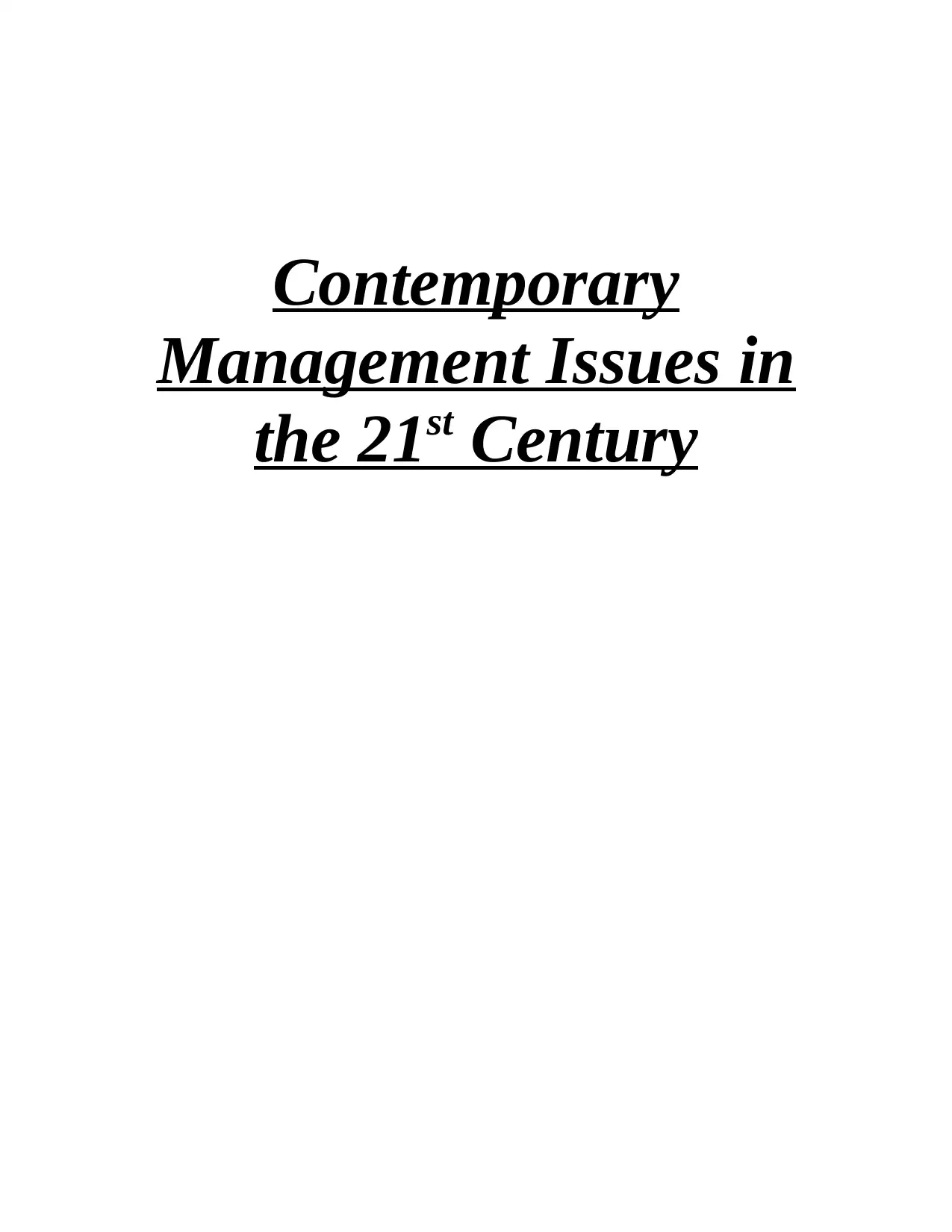
Contemporary
Management Issues in
the 21st Century
Management Issues in
the 21st Century
Paraphrase This Document
Need a fresh take? Get an instant paraphrase of this document with our AI Paraphraser

Contents
INTRODUCTION...........................................................................................................................1
MAIN BODY...................................................................................................................................1
ESSAY.............................................................................................................................................1
Critically analyse the theoretical model of entrepreneurship in context to contemporary
business, characterised by major global dislocations such as climate change.............................1
CONCLUSION ...............................................................................................................................5
REFERENCES................................................................................................................................6
INTRODUCTION...........................................................................................................................1
MAIN BODY...................................................................................................................................1
ESSAY.............................................................................................................................................1
Critically analyse the theoretical model of entrepreneurship in context to contemporary
business, characterised by major global dislocations such as climate change.............................1
CONCLUSION ...............................................................................................................................5
REFERENCES................................................................................................................................6
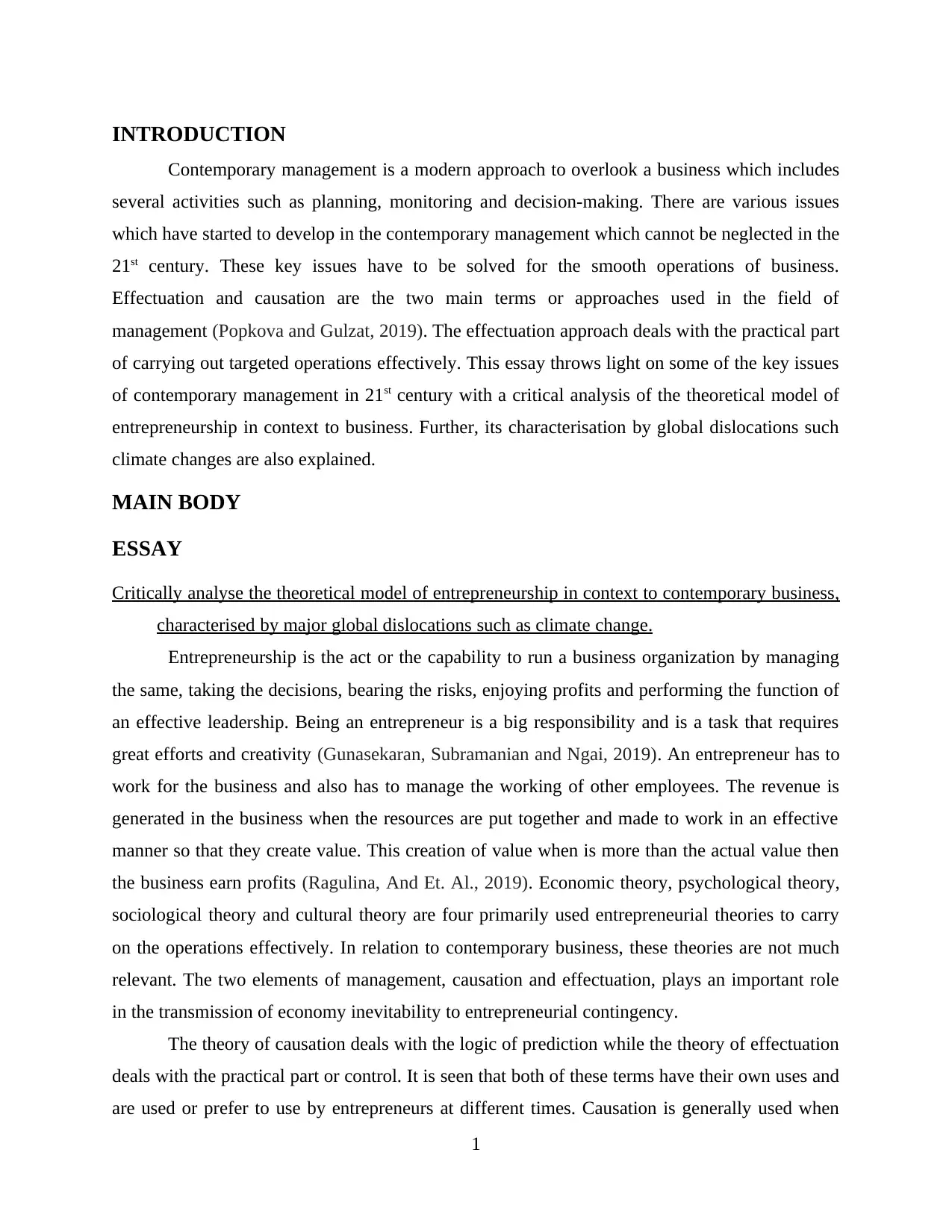
INTRODUCTION
Contemporary management is a modern approach to overlook a business which includes
several activities such as planning, monitoring and decision-making. There are various issues
which have started to develop in the contemporary management which cannot be neglected in the
21st century. These key issues have to be solved for the smooth operations of business.
Effectuation and causation are the two main terms or approaches used in the field of
management (Popkova and Gulzat, 2019). The effectuation approach deals with the practical part
of carrying out targeted operations effectively. This essay throws light on some of the key issues
of contemporary management in 21st century with a critical analysis of the theoretical model of
entrepreneurship in context to business. Further, its characterisation by global dislocations such
climate changes are also explained.
MAIN BODY
ESSAY
Critically analyse the theoretical model of entrepreneurship in context to contemporary business,
characterised by major global dislocations such as climate change.
Entrepreneurship is the act or the capability to run a business organization by managing
the same, taking the decisions, bearing the risks, enjoying profits and performing the function of
an effective leadership. Being an entrepreneur is a big responsibility and is a task that requires
great efforts and creativity (Gunasekaran, Subramanian and Ngai, 2019). An entrepreneur has to
work for the business and also has to manage the working of other employees. The revenue is
generated in the business when the resources are put together and made to work in an effective
manner so that they create value. This creation of value when is more than the actual value then
the business earn profits (Ragulina, And Et. Al., 2019). Economic theory, psychological theory,
sociological theory and cultural theory are four primarily used entrepreneurial theories to carry
on the operations effectively. In relation to contemporary business, these theories are not much
relevant. The two elements of management, causation and effectuation, plays an important role
in the transmission of economy inevitability to entrepreneurial contingency.
The theory of causation deals with the logic of prediction while the theory of effectuation
deals with the practical part or control. It is seen that both of these terms have their own uses and
are used or prefer to use by entrepreneurs at different times. Causation is generally used when
1
Contemporary management is a modern approach to overlook a business which includes
several activities such as planning, monitoring and decision-making. There are various issues
which have started to develop in the contemporary management which cannot be neglected in the
21st century. These key issues have to be solved for the smooth operations of business.
Effectuation and causation are the two main terms or approaches used in the field of
management (Popkova and Gulzat, 2019). The effectuation approach deals with the practical part
of carrying out targeted operations effectively. This essay throws light on some of the key issues
of contemporary management in 21st century with a critical analysis of the theoretical model of
entrepreneurship in context to business. Further, its characterisation by global dislocations such
climate changes are also explained.
MAIN BODY
ESSAY
Critically analyse the theoretical model of entrepreneurship in context to contemporary business,
characterised by major global dislocations such as climate change.
Entrepreneurship is the act or the capability to run a business organization by managing
the same, taking the decisions, bearing the risks, enjoying profits and performing the function of
an effective leadership. Being an entrepreneur is a big responsibility and is a task that requires
great efforts and creativity (Gunasekaran, Subramanian and Ngai, 2019). An entrepreneur has to
work for the business and also has to manage the working of other employees. The revenue is
generated in the business when the resources are put together and made to work in an effective
manner so that they create value. This creation of value when is more than the actual value then
the business earn profits (Ragulina, And Et. Al., 2019). Economic theory, psychological theory,
sociological theory and cultural theory are four primarily used entrepreneurial theories to carry
on the operations effectively. In relation to contemporary business, these theories are not much
relevant. The two elements of management, causation and effectuation, plays an important role
in the transmission of economy inevitability to entrepreneurial contingency.
The theory of causation deals with the logic of prediction while the theory of effectuation
deals with the practical part or control. It is seen that both of these terms have their own uses and
are used or prefer to use by entrepreneurs at different times. Causation is generally used when
1
⊘ This is a preview!⊘
Do you want full access?
Subscribe today to unlock all pages.

Trusted by 1+ million students worldwide
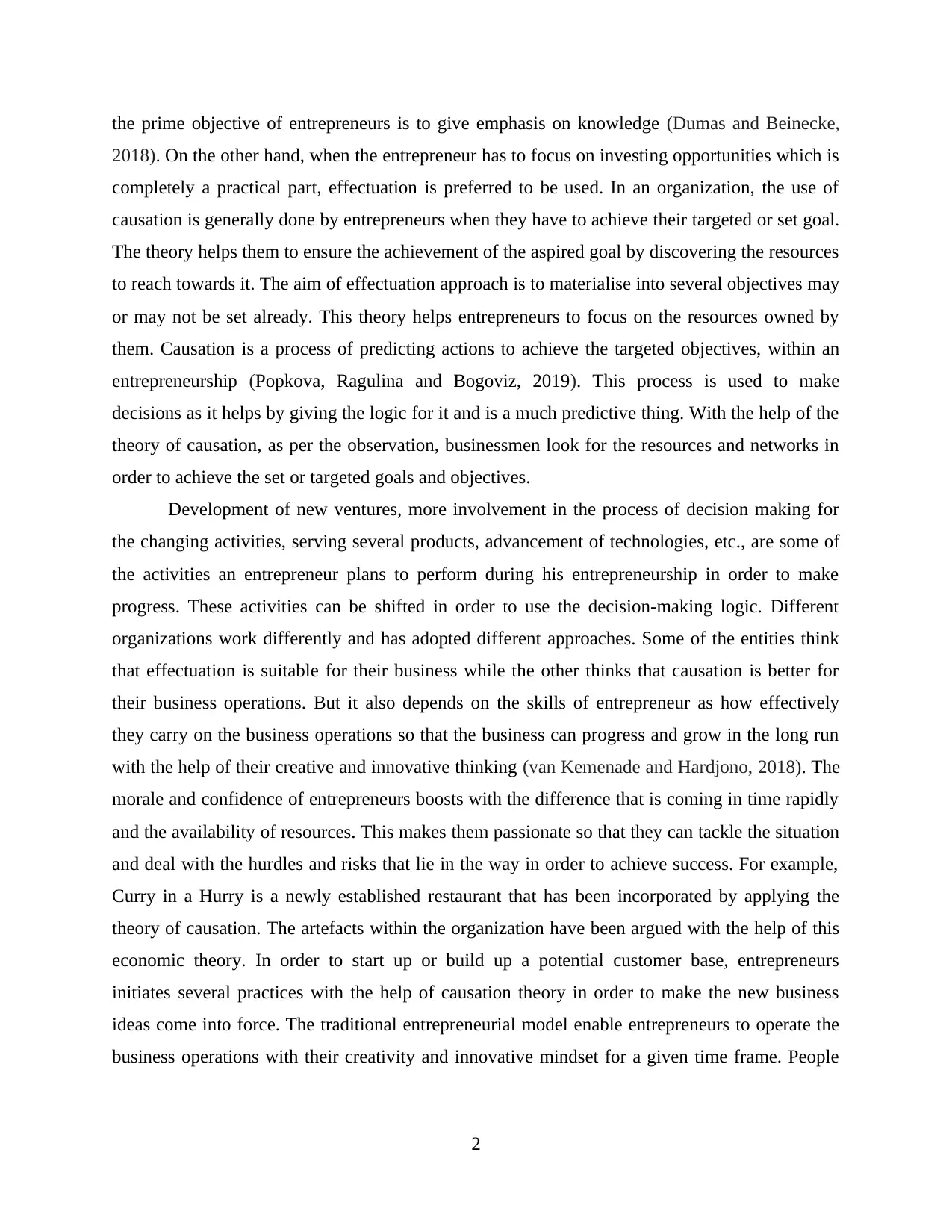
the prime objective of entrepreneurs is to give emphasis on knowledge (Dumas and Beinecke,
2018). On the other hand, when the entrepreneur has to focus on investing opportunities which is
completely a practical part, effectuation is preferred to be used. In an organization, the use of
causation is generally done by entrepreneurs when they have to achieve their targeted or set goal.
The theory helps them to ensure the achievement of the aspired goal by discovering the resources
to reach towards it. The aim of effectuation approach is to materialise into several objectives may
or may not be set already. This theory helps entrepreneurs to focus on the resources owned by
them. Causation is a process of predicting actions to achieve the targeted objectives, within an
entrepreneurship (Popkova, Ragulina and Bogoviz, 2019). This process is used to make
decisions as it helps by giving the logic for it and is a much predictive thing. With the help of the
theory of causation, as per the observation, businessmen look for the resources and networks in
order to achieve the set or targeted goals and objectives.
Development of new ventures, more involvement in the process of decision making for
the changing activities, serving several products, advancement of technologies, etc., are some of
the activities an entrepreneur plans to perform during his entrepreneurship in order to make
progress. These activities can be shifted in order to use the decision-making logic. Different
organizations work differently and has adopted different approaches. Some of the entities think
that effectuation is suitable for their business while the other thinks that causation is better for
their business operations. But it also depends on the skills of entrepreneur as how effectively
they carry on the business operations so that the business can progress and grow in the long run
with the help of their creative and innovative thinking (van Kemenade and Hardjono, 2018). The
morale and confidence of entrepreneurs boosts with the difference that is coming in time rapidly
and the availability of resources. This makes them passionate so that they can tackle the situation
and deal with the hurdles and risks that lie in the way in order to achieve success. For example,
Curry in a Hurry is a newly established restaurant that has been incorporated by applying the
theory of causation. The artefacts within the organization have been argued with the help of this
economic theory. In order to start up or build up a potential customer base, entrepreneurs
initiates several practices with the help of causation theory in order to make the new business
ideas come into force. The traditional entrepreneurial model enable entrepreneurs to operate the
business operations with their creativity and innovative mindset for a given time frame. People
2
2018). On the other hand, when the entrepreneur has to focus on investing opportunities which is
completely a practical part, effectuation is preferred to be used. In an organization, the use of
causation is generally done by entrepreneurs when they have to achieve their targeted or set goal.
The theory helps them to ensure the achievement of the aspired goal by discovering the resources
to reach towards it. The aim of effectuation approach is to materialise into several objectives may
or may not be set already. This theory helps entrepreneurs to focus on the resources owned by
them. Causation is a process of predicting actions to achieve the targeted objectives, within an
entrepreneurship (Popkova, Ragulina and Bogoviz, 2019). This process is used to make
decisions as it helps by giving the logic for it and is a much predictive thing. With the help of the
theory of causation, as per the observation, businessmen look for the resources and networks in
order to achieve the set or targeted goals and objectives.
Development of new ventures, more involvement in the process of decision making for
the changing activities, serving several products, advancement of technologies, etc., are some of
the activities an entrepreneur plans to perform during his entrepreneurship in order to make
progress. These activities can be shifted in order to use the decision-making logic. Different
organizations work differently and has adopted different approaches. Some of the entities think
that effectuation is suitable for their business while the other thinks that causation is better for
their business operations. But it also depends on the skills of entrepreneur as how effectively
they carry on the business operations so that the business can progress and grow in the long run
with the help of their creative and innovative thinking (van Kemenade and Hardjono, 2018). The
morale and confidence of entrepreneurs boosts with the difference that is coming in time rapidly
and the availability of resources. This makes them passionate so that they can tackle the situation
and deal with the hurdles and risks that lie in the way in order to achieve success. For example,
Curry in a Hurry is a newly established restaurant that has been incorporated by applying the
theory of causation. The artefacts within the organization have been argued with the help of this
economic theory. In order to start up or build up a potential customer base, entrepreneurs
initiates several practices with the help of causation theory in order to make the new business
ideas come into force. The traditional entrepreneurial model enable entrepreneurs to operate the
business operations with their creativity and innovative mindset for a given time frame. People
2
Paraphrase This Document
Need a fresh take? Get an instant paraphrase of this document with our AI Paraphraser
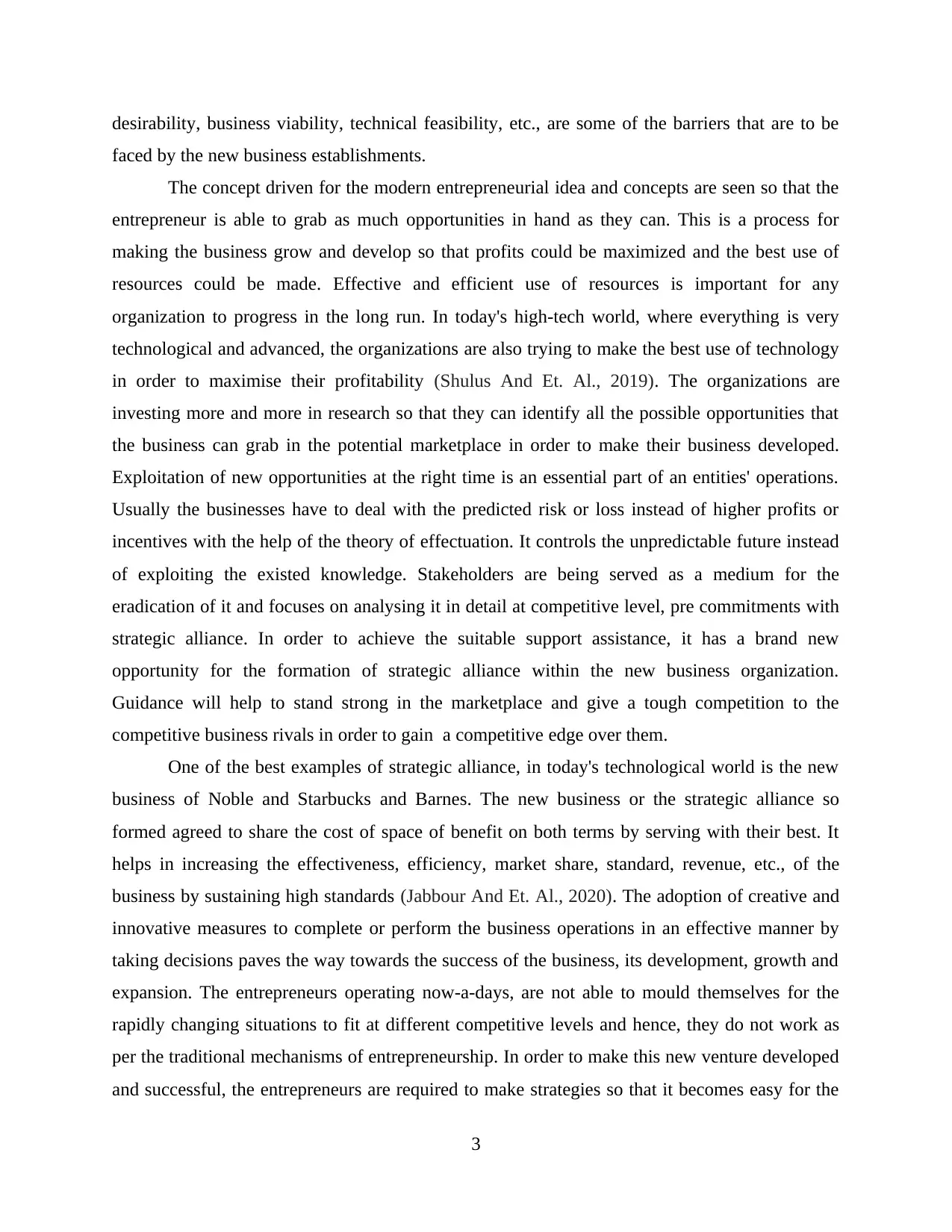
desirability, business viability, technical feasibility, etc., are some of the barriers that are to be
faced by the new business establishments.
The concept driven for the modern entrepreneurial idea and concepts are seen so that the
entrepreneur is able to grab as much opportunities in hand as they can. This is a process for
making the business grow and develop so that profits could be maximized and the best use of
resources could be made. Effective and efficient use of resources is important for any
organization to progress in the long run. In today's high-tech world, where everything is very
technological and advanced, the organizations are also trying to make the best use of technology
in order to maximise their profitability (Shulus And Et. Al., 2019). The organizations are
investing more and more in research so that they can identify all the possible opportunities that
the business can grab in the potential marketplace in order to make their business developed.
Exploitation of new opportunities at the right time is an essential part of an entities' operations.
Usually the businesses have to deal with the predicted risk or loss instead of higher profits or
incentives with the help of the theory of effectuation. It controls the unpredictable future instead
of exploiting the existed knowledge. Stakeholders are being served as a medium for the
eradication of it and focuses on analysing it in detail at competitive level, pre commitments with
strategic alliance. In order to achieve the suitable support assistance, it has a brand new
opportunity for the formation of strategic alliance within the new business organization.
Guidance will help to stand strong in the marketplace and give a tough competition to the
competitive business rivals in order to gain a competitive edge over them.
One of the best examples of strategic alliance, in today's technological world is the new
business of Noble and Starbucks and Barnes. The new business or the strategic alliance so
formed agreed to share the cost of space of benefit on both terms by serving with their best. It
helps in increasing the effectiveness, efficiency, market share, standard, revenue, etc., of the
business by sustaining high standards (Jabbour And Et. Al., 2020). The adoption of creative and
innovative measures to complete or perform the business operations in an effective manner by
taking decisions paves the way towards the success of the business, its development, growth and
expansion. The entrepreneurs operating now-a-days, are not able to mould themselves for the
rapidly changing situations to fit at different competitive levels and hence, they do not work as
per the traditional mechanisms of entrepreneurship. In order to make this new venture developed
and successful, the entrepreneurs are required to make strategies so that it becomes easy for the
3
faced by the new business establishments.
The concept driven for the modern entrepreneurial idea and concepts are seen so that the
entrepreneur is able to grab as much opportunities in hand as they can. This is a process for
making the business grow and develop so that profits could be maximized and the best use of
resources could be made. Effective and efficient use of resources is important for any
organization to progress in the long run. In today's high-tech world, where everything is very
technological and advanced, the organizations are also trying to make the best use of technology
in order to maximise their profitability (Shulus And Et. Al., 2019). The organizations are
investing more and more in research so that they can identify all the possible opportunities that
the business can grab in the potential marketplace in order to make their business developed.
Exploitation of new opportunities at the right time is an essential part of an entities' operations.
Usually the businesses have to deal with the predicted risk or loss instead of higher profits or
incentives with the help of the theory of effectuation. It controls the unpredictable future instead
of exploiting the existed knowledge. Stakeholders are being served as a medium for the
eradication of it and focuses on analysing it in detail at competitive level, pre commitments with
strategic alliance. In order to achieve the suitable support assistance, it has a brand new
opportunity for the formation of strategic alliance within the new business organization.
Guidance will help to stand strong in the marketplace and give a tough competition to the
competitive business rivals in order to gain a competitive edge over them.
One of the best examples of strategic alliance, in today's technological world is the new
business of Noble and Starbucks and Barnes. The new business or the strategic alliance so
formed agreed to share the cost of space of benefit on both terms by serving with their best. It
helps in increasing the effectiveness, efficiency, market share, standard, revenue, etc., of the
business by sustaining high standards (Jabbour And Et. Al., 2020). The adoption of creative and
innovative measures to complete or perform the business operations in an effective manner by
taking decisions paves the way towards the success of the business, its development, growth and
expansion. The entrepreneurs operating now-a-days, are not able to mould themselves for the
rapidly changing situations to fit at different competitive levels and hence, they do not work as
per the traditional mechanisms of entrepreneurship. In order to make this new venture developed
and successful, the entrepreneurs are required to make strategies so that it becomes easy for the
3
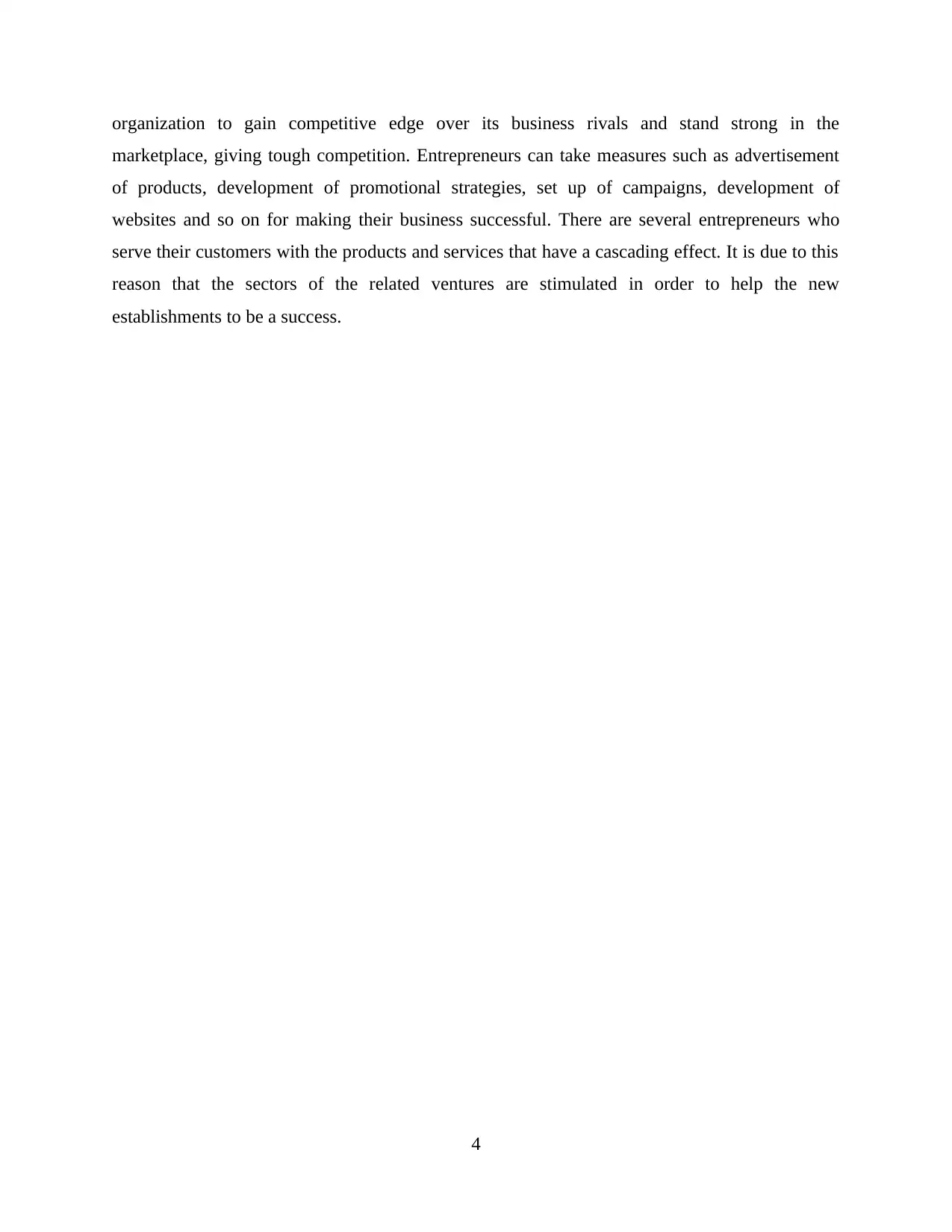
organization to gain competitive edge over its business rivals and stand strong in the
marketplace, giving tough competition. Entrepreneurs can take measures such as advertisement
of products, development of promotional strategies, set up of campaigns, development of
websites and so on for making their business successful. There are several entrepreneurs who
serve their customers with the products and services that have a cascading effect. It is due to this
reason that the sectors of the related ventures are stimulated in order to help the new
establishments to be a success.
4
marketplace, giving tough competition. Entrepreneurs can take measures such as advertisement
of products, development of promotional strategies, set up of campaigns, development of
websites and so on for making their business successful. There are several entrepreneurs who
serve their customers with the products and services that have a cascading effect. It is due to this
reason that the sectors of the related ventures are stimulated in order to help the new
establishments to be a success.
4
⊘ This is a preview!⊘
Do you want full access?
Subscribe today to unlock all pages.

Trusted by 1+ million students worldwide
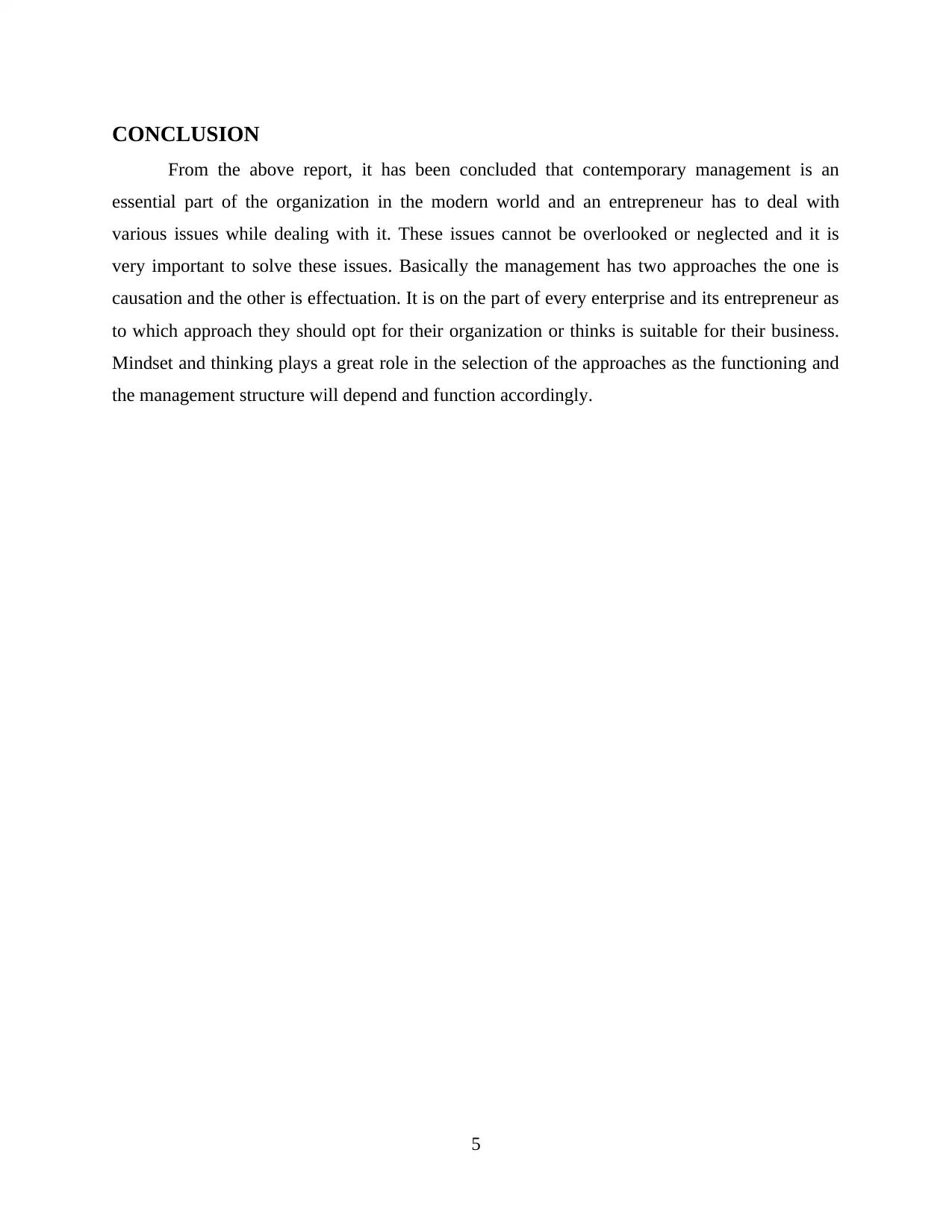
CONCLUSION
From the above report, it has been concluded that contemporary management is an
essential part of the organization in the modern world and an entrepreneur has to deal with
various issues while dealing with it. These issues cannot be overlooked or neglected and it is
very important to solve these issues. Basically the management has two approaches the one is
causation and the other is effectuation. It is on the part of every enterprise and its entrepreneur as
to which approach they should opt for their organization or thinks is suitable for their business.
Mindset and thinking plays a great role in the selection of the approaches as the functioning and
the management structure will depend and function accordingly.
5
From the above report, it has been concluded that contemporary management is an
essential part of the organization in the modern world and an entrepreneur has to deal with
various issues while dealing with it. These issues cannot be overlooked or neglected and it is
very important to solve these issues. Basically the management has two approaches the one is
causation and the other is effectuation. It is on the part of every enterprise and its entrepreneur as
to which approach they should opt for their organization or thinks is suitable for their business.
Mindset and thinking plays a great role in the selection of the approaches as the functioning and
the management structure will depend and function accordingly.
5
Paraphrase This Document
Need a fresh take? Get an instant paraphrase of this document with our AI Paraphraser
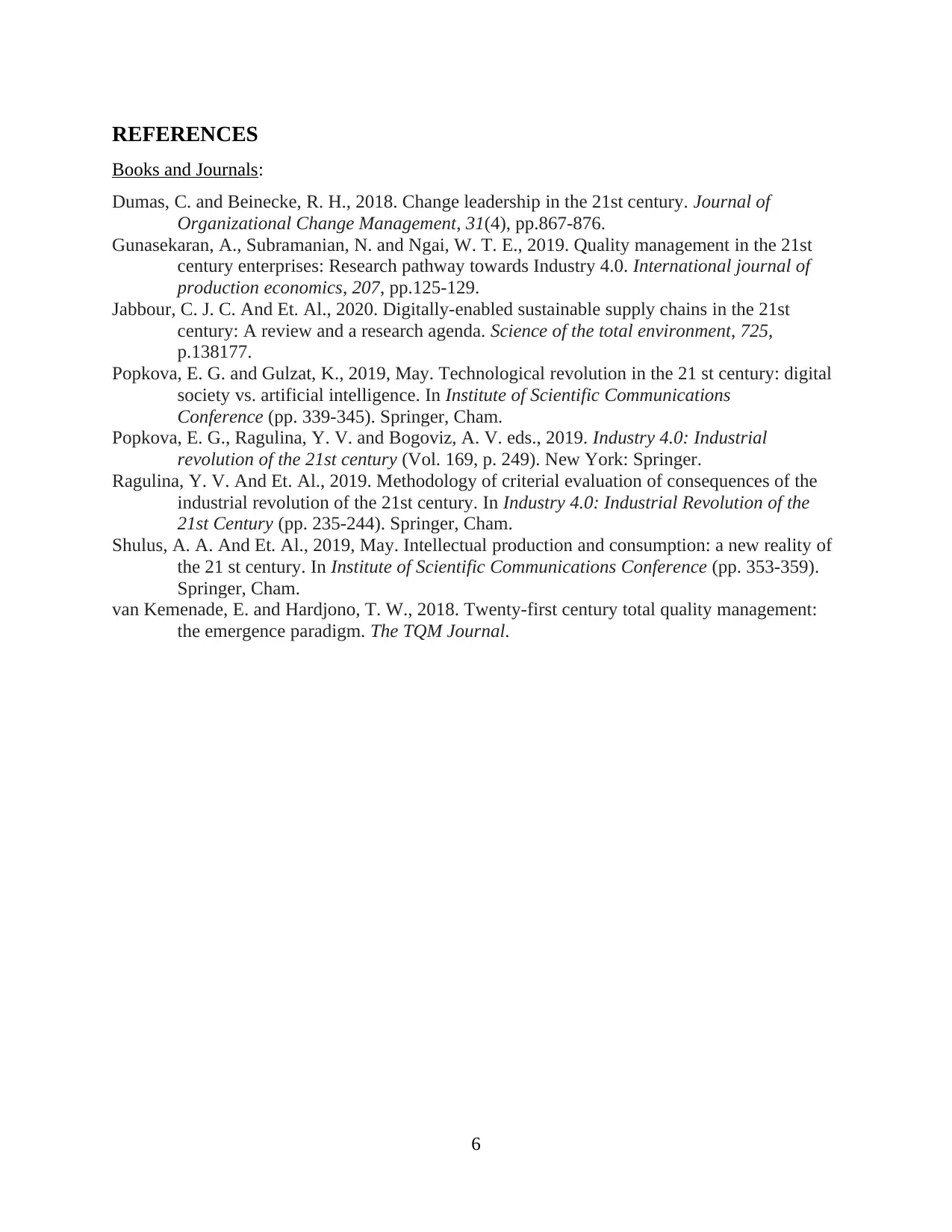
REFERENCES
Books and Journals:
Dumas, C. and Beinecke, R. H., 2018. Change leadership in the 21st century. Journal of
Organizational Change Management, 31(4), pp.867-876.
Gunasekaran, A., Subramanian, N. and Ngai, W. T. E., 2019. Quality management in the 21st
century enterprises: Research pathway towards Industry 4.0. International journal of
production economics, 207, pp.125-129.
Jabbour, C. J. C. And Et. Al., 2020. Digitally-enabled sustainable supply chains in the 21st
century: A review and a research agenda. Science of the total environment, 725,
p.138177.
Popkova, E. G. and Gulzat, K., 2019, May. Technological revolution in the 21 st century: digital
society vs. artificial intelligence. In Institute of Scientific Communications
Conference (pp. 339-345). Springer, Cham.
Popkova, E. G., Ragulina, Y. V. and Bogoviz, A. V. eds., 2019. Industry 4.0: Industrial
revolution of the 21st century (Vol. 169, p. 249). New York: Springer.
Ragulina, Y. V. And Et. Al., 2019. Methodology of criterial evaluation of consequences of the
industrial revolution of the 21st century. In Industry 4.0: Industrial Revolution of the
21st Century (pp. 235-244). Springer, Cham.
Shulus, A. A. And Et. Al., 2019, May. Intellectual production and consumption: a new reality of
the 21 st century. In Institute of Scientific Communications Conference (pp. 353-359).
Springer, Cham.
van Kemenade, E. and Hardjono, T. W., 2018. Twenty-first century total quality management:
the emergence paradigm. The TQM Journal.
6
Books and Journals:
Dumas, C. and Beinecke, R. H., 2018. Change leadership in the 21st century. Journal of
Organizational Change Management, 31(4), pp.867-876.
Gunasekaran, A., Subramanian, N. and Ngai, W. T. E., 2019. Quality management in the 21st
century enterprises: Research pathway towards Industry 4.0. International journal of
production economics, 207, pp.125-129.
Jabbour, C. J. C. And Et. Al., 2020. Digitally-enabled sustainable supply chains in the 21st
century: A review and a research agenda. Science of the total environment, 725,
p.138177.
Popkova, E. G. and Gulzat, K., 2019, May. Technological revolution in the 21 st century: digital
society vs. artificial intelligence. In Institute of Scientific Communications
Conference (pp. 339-345). Springer, Cham.
Popkova, E. G., Ragulina, Y. V. and Bogoviz, A. V. eds., 2019. Industry 4.0: Industrial
revolution of the 21st century (Vol. 169, p. 249). New York: Springer.
Ragulina, Y. V. And Et. Al., 2019. Methodology of criterial evaluation of consequences of the
industrial revolution of the 21st century. In Industry 4.0: Industrial Revolution of the
21st Century (pp. 235-244). Springer, Cham.
Shulus, A. A. And Et. Al., 2019, May. Intellectual production and consumption: a new reality of
the 21 st century. In Institute of Scientific Communications Conference (pp. 353-359).
Springer, Cham.
van Kemenade, E. and Hardjono, T. W., 2018. Twenty-first century total quality management:
the emergence paradigm. The TQM Journal.
6
1 out of 8
Related Documents
Your All-in-One AI-Powered Toolkit for Academic Success.
+13062052269
info@desklib.com
Available 24*7 on WhatsApp / Email
![[object Object]](/_next/static/media/star-bottom.7253800d.svg)
Unlock your academic potential
Copyright © 2020–2026 A2Z Services. All Rights Reserved. Developed and managed by ZUCOL.



